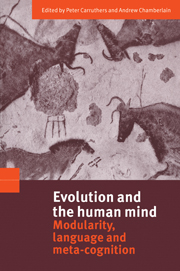Book contents
- Frontmatter
- Contents
- List of contributors
- Preface
- 1 Introduction
- 2 Massively modular minds: evolutionary psychology and cognitive architecture
- 3 Individual differences in early understanding of mind: genes, non-shared environment and modularity
- 4 Darwin in the madhouse: evolutionary psychology and the classification of mental disorders
- 5 Evolution of the modern mind and the origins of culture: religious concepts as a limiting-case
- 6 Symmetry and the evolution of the modular linguistic mind
- 7 Evolution, communication and the proper function of language
- 8 The evolution of knowledge
- 9 Mind, brain and material culture: an archaeological perspective
- 10 The evolution of strategic thinking
- 11 On the origin of the human mind
- 12 The evolution of consciousness
- 13 Evolution, consciousness and the internality of the mind
- References
- Author index
- Subject index
11 - On the origin of the human mind
Published online by Cambridge University Press: 18 December 2009
- Frontmatter
- Contents
- List of contributors
- Preface
- 1 Introduction
- 2 Massively modular minds: evolutionary psychology and cognitive architecture
- 3 Individual differences in early understanding of mind: genes, non-shared environment and modularity
- 4 Darwin in the madhouse: evolutionary psychology and the classification of mental disorders
- 5 Evolution of the modern mind and the origins of culture: religious concepts as a limiting-case
- 6 Symmetry and the evolution of the modular linguistic mind
- 7 Evolution, communication and the proper function of language
- 8 The evolution of knowledge
- 9 Mind, brain and material culture: an archaeological perspective
- 10 The evolution of strategic thinking
- 11 On the origin of the human mind
- 12 The evolution of consciousness
- 13 Evolution, consciousness and the internality of the mind
- References
- Author index
- Subject index
Summary
Humans seem to lie on a different cognitive plane to the other primates. My aim in this chapter is to try to provide an explanation as to why and when this might have come about. First, however, I want to identify what seem to me to be crucial cognitive differences between humans and other primates: these I characterise in terms of theory-of-mind ability, though I do not want to suggest that this is all there is to the human-ape difference. I shall then go on to offer an explanation as to why humans should need these additional cognitive abilities and conclude by offering a suggestion as to when they might have evolved.
What makes us human?
While we undoubtedly share a great deal in cognitive terms with our primate cousins, there must be some features that set us apart. At least, this is the implication of our intuition that we are in some sense ‘smarter’ and socially more complex than our nearest relatives, the great apes. Although we do not have a particularly clear handle on this problem as yet, there are nonetheless some features that we can point to as promising candidates. One of these is Theory of Mind (ToM: the ability to understand another's mental state, sometimes also known as ‘mind-reading’) (Perner and Wimmer, 1985). Although I shall focus exclusively on ToM here, I want to emphasise the fact that there may be other features of our cognitive machinery that may also be important.
- Type
- Chapter
- Information
- Evolution and the Human MindModularity, Language and Meta-Cognition, pp. 238 - 253Publisher: Cambridge University PressPrint publication year: 2000
- 29
- Cited by



